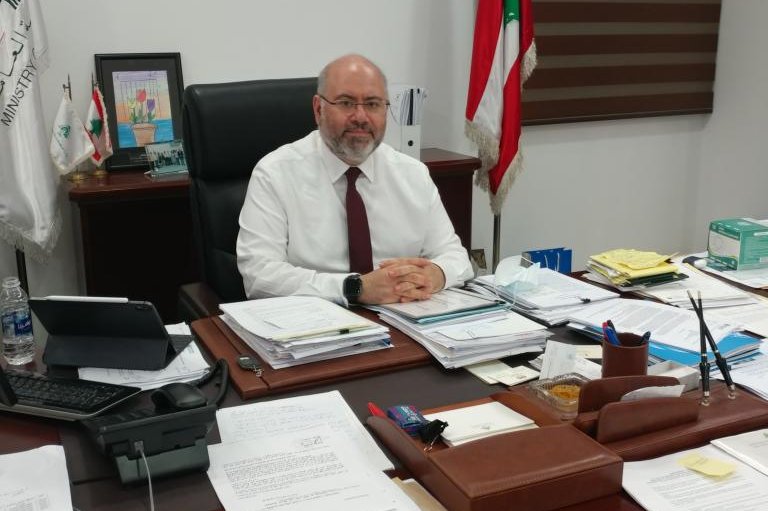1 of 4 | Lebanon Health Minister Firas Abiad said the country's healthcare system is in dire need of financial assistance. Photo by Dalal Saoud/UPI
BEIRUT, Lebanon, Nov. 30 (UPI) -- Cash-strapped Lebanon needs to find new sources of financing to keep providing healthcare for a traumatized population struggling with shortages of medications, skyrocketing hospitalization costs and an exodus of doctors and nurses, Health Minister Firas Abiad said in an interview with UPI.
Abiad, who announced earlier this month a gradual lifting of subsidies on medicines, including some for chronic illnesses, said late Monday the country's unprecedented financial crisis has left the healthcare system in "a precarious situation."
Only $25 million is left to buy medications and $10 million to purchase medical supplies and medical raw material.
"We are not able to buy all what we need...It all depends on the funding that the government has. It is clear that Lebanon needs to find sources of financing," Abiad said.
After much delay and a failed attempt in July 2020, Lebanon has recently resumed negotiations with the International Monetary Fund on a recovery plan that would enable it to address the economic crisis and pave the way for international assistance.
Lebanon has been facing a deep, compounded crisis since October 2019 that resulted in soaring poverty and unemployment, with the Lebanese pound losing more than 90 percent of its value and most of its sectors collapsing one after the other.
'Whole life affeccted'
With dwindling foreign currency reserves and shortage of U.S. dollars, the government is running out of resources and cannot keep subsidies.
"This is why we are having the talks with the IMF and other financial bodies. We need those talks to be able to start receiving some funds so that we can allocate them," Abiad said, adding that financing is at the core of all issues facing Lebanon.
"At the end of the day, if you don't have the financial resources, your whole life is being affected. This is what happening with our system," he said. "To solve all of these problems is to be able to get finance, so that we can continue providing services."
Subsidy cuts have greatly impacted an impoverished population. Pharmacists in Beirut say people can no longer afford to buy their medications and are forced to opt for the least expensive and skip others prescribed by their doctors.
Abiad, however, noted that his ministry is making "free medications," donated by the World Health Organization and foreign countries, available at primary healthcare centers.
"People started to go now for those centers, so that they can get their medications for free," he said. "We are not left on our own. There are lots of countries supporting us and sending us medications. But at the end of the day, our livelihood must depend on what we do and not what other countries are willing to offer."
By supporting the country's medical industry, the health minister hopes a lot of medications would be produced locally and be available at lower prices.
"It all depends really on our attitude and how to solve this problem. In crisis times, there are always opportunities, but you have to take these opportunities. Are we going to do that? I hope so," he said.
Healthcare hardship
With hospitalization costs also skyrocketing, more people are seeking medical care at the public hospitals because "people cannot afford to go to the private hospitals" anymore.
A recent study conducted at the government-run Rafik Hariri University Hospital showed an increase of 30% to 40% in patients coming to its emergency room, an indication of a significant shift from private to public hospitals.
According to remarks by a WHO official in Lebanon in September, unpaid bills by the government to both private and public health sectors is threatening the sustainability of health services and increasing health financial hardship on vulnerable populations. The United Nations agency noted that the Lebanese Health Ministry will need to cover healthcare for at least 70% of the population (compared to 48% prior to the current crisis) as unemployment and poverty are rising.
WHO also estimated that around 15% to 17% of 20 000 registered nurses have left the country over the past 12 months, while more than 1,000 have been laid off. Moreover, around 40% of medical doctors, mainly specialists, have permanently emigrated or are working on a part-time basis outside the country.
"Shortages in the healthcare services due to the fact that doctors and nurses are leaving is another challenge," Abiad said. "That really left our healthcare system in a precarious situation."
Attracting them back won't be easy this time.
"A lot of our medical staff, once they leave and establish themselves outside, it will not be easy for them to come back, especially that the reasons why they left are still around," the health minister said. "Without fixing the economy, without fixing the country, the reasons why those people have left remain."
COVID-19 rising
Another emerging health concern is the number of COVID-19 cases that started to rise again, with only 40% of the population fully vaccinated.
"The plan is to boost up our vaccination, by opening up our centers and removing all obstacles, so that all age groups can come and get vaccinated," Abiad said. The focus will be on the most important sectors, including education, "to allow our schools to remain open."
Lebanon still has "a large number of vaccines" that were secured by a World Bank loan last year.
But to avoid last year's dramatic increase in coronavirus cases following Christmas and New Year festivities, Abiad said the health ministry was trying to increase the capacity of the hospitals "to make sure that we don't have a repetition of what happened last year."
Lebanon has registered 668,605 coronavirus cases and 8,716 deaths since the outbreak of the pandemic.















